Australian Tax Residency: Analyzing Harding v Commissioner Cases
VerifiedAdded on 2022/11/17
|7
|2471
|499
Essay
AI Summary
This essay critically analyzes the implications of the Harding v Commissioner of Taxation [2018] and Harding v Federal Commissioner of Taxation [2019] cases on Australian tax residency. It examines the impact on Australian expats, exploring how the judgments affect the application of the ordinary concepts test and the definition of a permanent place of abode. The essay delves into the complexities of determining tax residency, especially for individuals living and working abroad, and highlights the significance of the taxpayer's intention alongside the nature of their accommodation. It discusses the contrasting decisions of the Federal Court and the Full Federal Court, emphasizing the need for clarity and predictability in residency rules to benefit Australian taxpayers working overseas. The analysis covers the shift in focus from accommodation to intention, the holistic approach adopted by the courts, and the implications for domicile holders, providing a comprehensive overview of the tax residency landscape in Australia.
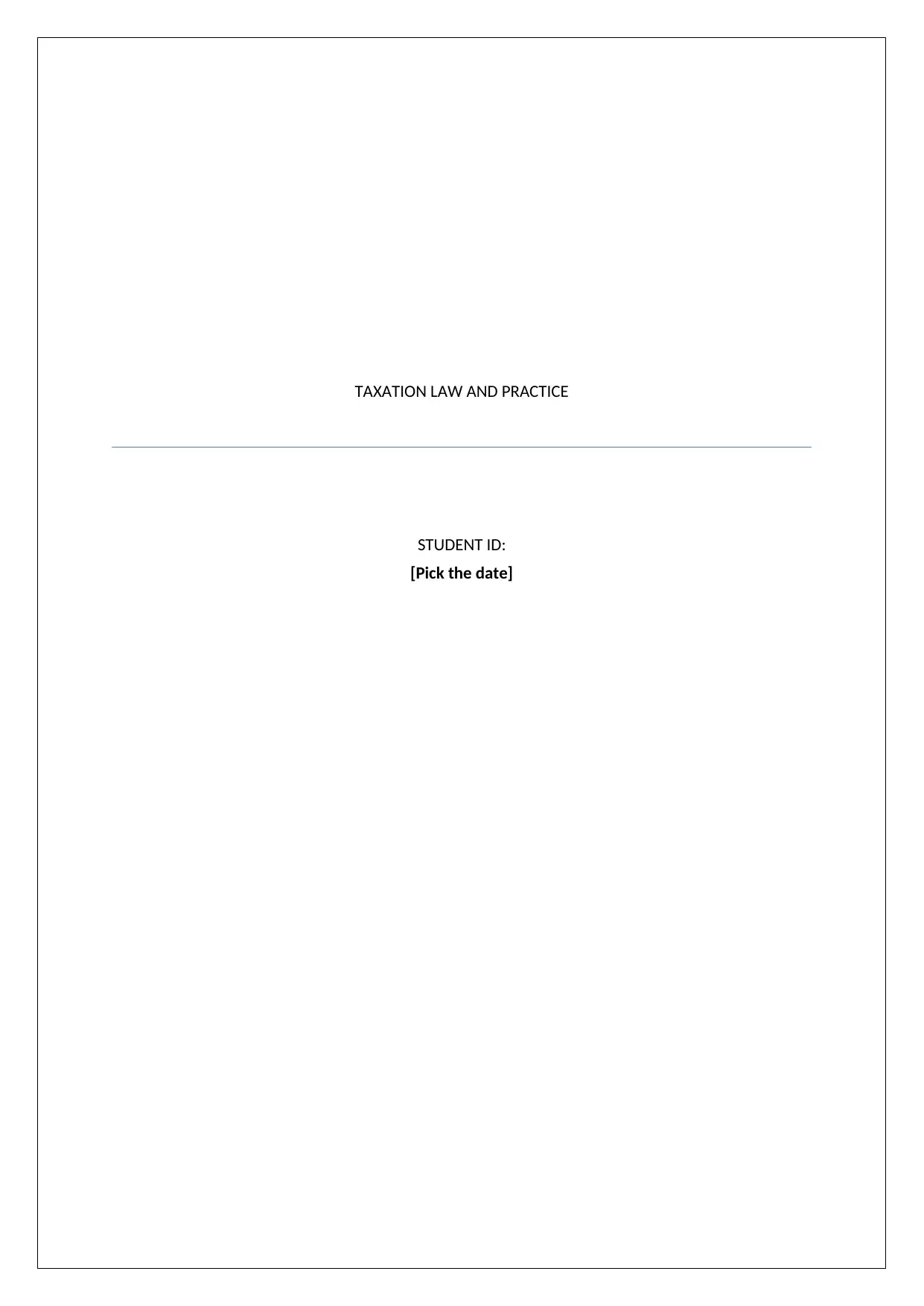
TAXATION LAW AND PRACTICE
STUDENT ID:
[Pick the date]
STUDENT ID:
[Pick the date]
Paraphrase This Document
Need a fresh take? Get an instant paraphrase of this document with our AI Paraphraser
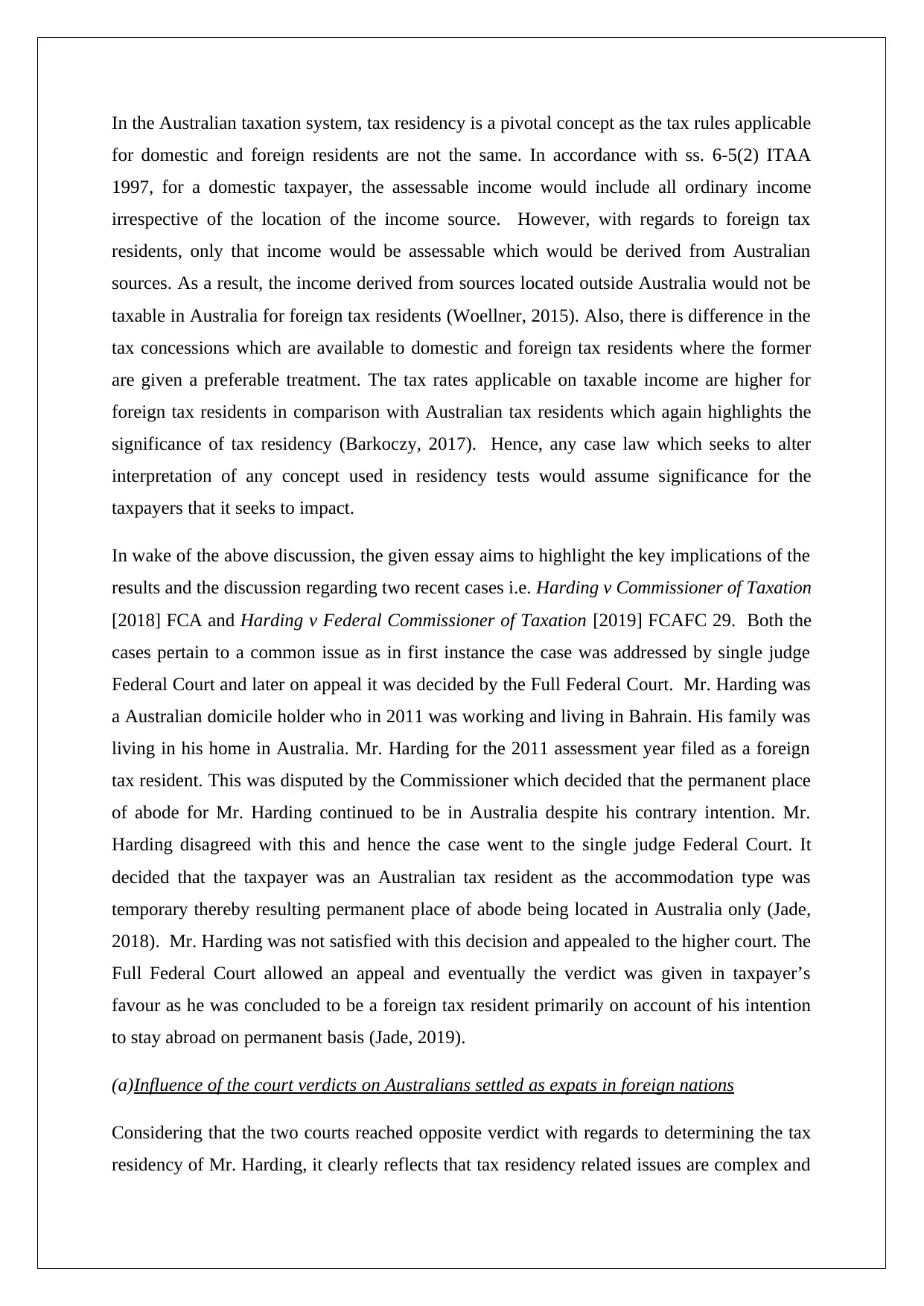
In the Australian taxation system, tax residency is a pivotal concept as the tax rules applicable
for domestic and foreign residents are not the same. In accordance with ss. 6-5(2) ITAA
1997, for a domestic taxpayer, the assessable income would include all ordinary income
irrespective of the location of the income source. However, with regards to foreign tax
residents, only that income would be assessable which would be derived from Australian
sources. As a result, the income derived from sources located outside Australia would not be
taxable in Australia for foreign tax residents (Woellner, 2015). Also, there is difference in the
tax concessions which are available to domestic and foreign tax residents where the former
are given a preferable treatment. The tax rates applicable on taxable income are higher for
foreign tax residents in comparison with Australian tax residents which again highlights the
significance of tax residency (Barkoczy, 2017). Hence, any case law which seeks to alter
interpretation of any concept used in residency tests would assume significance for the
taxpayers that it seeks to impact.
In wake of the above discussion, the given essay aims to highlight the key implications of the
results and the discussion regarding two recent cases i.e. Harding v Commissioner of Taxation
[2018] FCA and Harding v Federal Commissioner of Taxation [2019] FCAFC 29. Both the
cases pertain to a common issue as in first instance the case was addressed by single judge
Federal Court and later on appeal it was decided by the Full Federal Court. Mr. Harding was
a Australian domicile holder who in 2011 was working and living in Bahrain. His family was
living in his home in Australia. Mr. Harding for the 2011 assessment year filed as a foreign
tax resident. This was disputed by the Commissioner which decided that the permanent place
of abode for Mr. Harding continued to be in Australia despite his contrary intention. Mr.
Harding disagreed with this and hence the case went to the single judge Federal Court. It
decided that the taxpayer was an Australian tax resident as the accommodation type was
temporary thereby resulting permanent place of abode being located in Australia only (Jade,
2018). Mr. Harding was not satisfied with this decision and appealed to the higher court. The
Full Federal Court allowed an appeal and eventually the verdict was given in taxpayer’s
favour as he was concluded to be a foreign tax resident primarily on account of his intention
to stay abroad on permanent basis (Jade, 2019).
(a)Influence of the court verdicts on Australians settled as expats in foreign nations
Considering that the two courts reached opposite verdict with regards to determining the tax
residency of Mr. Harding, it clearly reflects that tax residency related issues are complex and
for domestic and foreign residents are not the same. In accordance with ss. 6-5(2) ITAA
1997, for a domestic taxpayer, the assessable income would include all ordinary income
irrespective of the location of the income source. However, with regards to foreign tax
residents, only that income would be assessable which would be derived from Australian
sources. As a result, the income derived from sources located outside Australia would not be
taxable in Australia for foreign tax residents (Woellner, 2015). Also, there is difference in the
tax concessions which are available to domestic and foreign tax residents where the former
are given a preferable treatment. The tax rates applicable on taxable income are higher for
foreign tax residents in comparison with Australian tax residents which again highlights the
significance of tax residency (Barkoczy, 2017). Hence, any case law which seeks to alter
interpretation of any concept used in residency tests would assume significance for the
taxpayers that it seeks to impact.
In wake of the above discussion, the given essay aims to highlight the key implications of the
results and the discussion regarding two recent cases i.e. Harding v Commissioner of Taxation
[2018] FCA and Harding v Federal Commissioner of Taxation [2019] FCAFC 29. Both the
cases pertain to a common issue as in first instance the case was addressed by single judge
Federal Court and later on appeal it was decided by the Full Federal Court. Mr. Harding was
a Australian domicile holder who in 2011 was working and living in Bahrain. His family was
living in his home in Australia. Mr. Harding for the 2011 assessment year filed as a foreign
tax resident. This was disputed by the Commissioner which decided that the permanent place
of abode for Mr. Harding continued to be in Australia despite his contrary intention. Mr.
Harding disagreed with this and hence the case went to the single judge Federal Court. It
decided that the taxpayer was an Australian tax resident as the accommodation type was
temporary thereby resulting permanent place of abode being located in Australia only (Jade,
2018). Mr. Harding was not satisfied with this decision and appealed to the higher court. The
Full Federal Court allowed an appeal and eventually the verdict was given in taxpayer’s
favour as he was concluded to be a foreign tax resident primarily on account of his intention
to stay abroad on permanent basis (Jade, 2019).
(a)Influence of the court verdicts on Australians settled as expats in foreign nations
Considering that the two courts reached opposite verdict with regards to determining the tax
residency of Mr. Harding, it clearly reflects that tax residency related issues are complex and
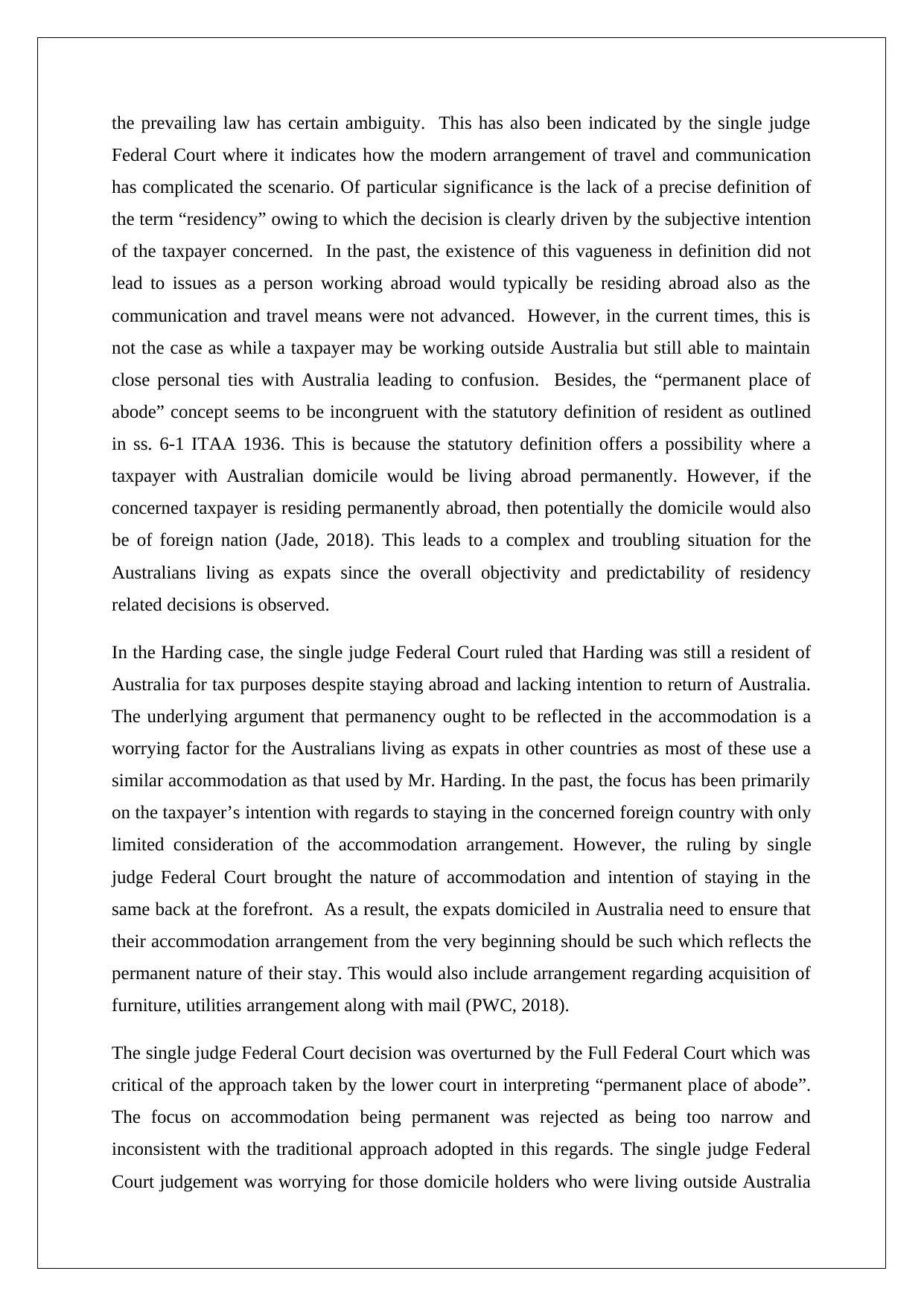
the prevailing law has certain ambiguity. This has also been indicated by the single judge
Federal Court where it indicates how the modern arrangement of travel and communication
has complicated the scenario. Of particular significance is the lack of a precise definition of
the term “residency” owing to which the decision is clearly driven by the subjective intention
of the taxpayer concerned. In the past, the existence of this vagueness in definition did not
lead to issues as a person working abroad would typically be residing abroad also as the
communication and travel means were not advanced. However, in the current times, this is
not the case as while a taxpayer may be working outside Australia but still able to maintain
close personal ties with Australia leading to confusion. Besides, the “permanent place of
abode” concept seems to be incongruent with the statutory definition of resident as outlined
in ss. 6-1 ITAA 1936. This is because the statutory definition offers a possibility where a
taxpayer with Australian domicile would be living abroad permanently. However, if the
concerned taxpayer is residing permanently abroad, then potentially the domicile would also
be of foreign nation (Jade, 2018). This leads to a complex and troubling situation for the
Australians living as expats since the overall objectivity and predictability of residency
related decisions is observed.
In the Harding case, the single judge Federal Court ruled that Harding was still a resident of
Australia for tax purposes despite staying abroad and lacking intention to return of Australia.
The underlying argument that permanency ought to be reflected in the accommodation is a
worrying factor for the Australians living as expats in other countries as most of these use a
similar accommodation as that used by Mr. Harding. In the past, the focus has been primarily
on the taxpayer’s intention with regards to staying in the concerned foreign country with only
limited consideration of the accommodation arrangement. However, the ruling by single
judge Federal Court brought the nature of accommodation and intention of staying in the
same back at the forefront. As a result, the expats domiciled in Australia need to ensure that
their accommodation arrangement from the very beginning should be such which reflects the
permanent nature of their stay. This would also include arrangement regarding acquisition of
furniture, utilities arrangement along with mail (PWC, 2018).
The single judge Federal Court decision was overturned by the Full Federal Court which was
critical of the approach taken by the lower court in interpreting “permanent place of abode”.
The focus on accommodation being permanent was rejected as being too narrow and
inconsistent with the traditional approach adopted in this regards. The single judge Federal
Court judgement was worrying for those domicile holders who were living outside Australia
Federal Court where it indicates how the modern arrangement of travel and communication
has complicated the scenario. Of particular significance is the lack of a precise definition of
the term “residency” owing to which the decision is clearly driven by the subjective intention
of the taxpayer concerned. In the past, the existence of this vagueness in definition did not
lead to issues as a person working abroad would typically be residing abroad also as the
communication and travel means were not advanced. However, in the current times, this is
not the case as while a taxpayer may be working outside Australia but still able to maintain
close personal ties with Australia leading to confusion. Besides, the “permanent place of
abode” concept seems to be incongruent with the statutory definition of resident as outlined
in ss. 6-1 ITAA 1936. This is because the statutory definition offers a possibility where a
taxpayer with Australian domicile would be living abroad permanently. However, if the
concerned taxpayer is residing permanently abroad, then potentially the domicile would also
be of foreign nation (Jade, 2018). This leads to a complex and troubling situation for the
Australians living as expats since the overall objectivity and predictability of residency
related decisions is observed.
In the Harding case, the single judge Federal Court ruled that Harding was still a resident of
Australia for tax purposes despite staying abroad and lacking intention to return of Australia.
The underlying argument that permanency ought to be reflected in the accommodation is a
worrying factor for the Australians living as expats in other countries as most of these use a
similar accommodation as that used by Mr. Harding. In the past, the focus has been primarily
on the taxpayer’s intention with regards to staying in the concerned foreign country with only
limited consideration of the accommodation arrangement. However, the ruling by single
judge Federal Court brought the nature of accommodation and intention of staying in the
same back at the forefront. As a result, the expats domiciled in Australia need to ensure that
their accommodation arrangement from the very beginning should be such which reflects the
permanent nature of their stay. This would also include arrangement regarding acquisition of
furniture, utilities arrangement along with mail (PWC, 2018).
The single judge Federal Court decision was overturned by the Full Federal Court which was
critical of the approach taken by the lower court in interpreting “permanent place of abode”.
The focus on accommodation being permanent was rejected as being too narrow and
inconsistent with the traditional approach adopted in this regards. The single judge Federal
Court judgement was worrying for those domicile holders who were living outside Australia
⊘ This is a preview!⊘
Do you want full access?
Subscribe today to unlock all pages.

Trusted by 1+ million students worldwide
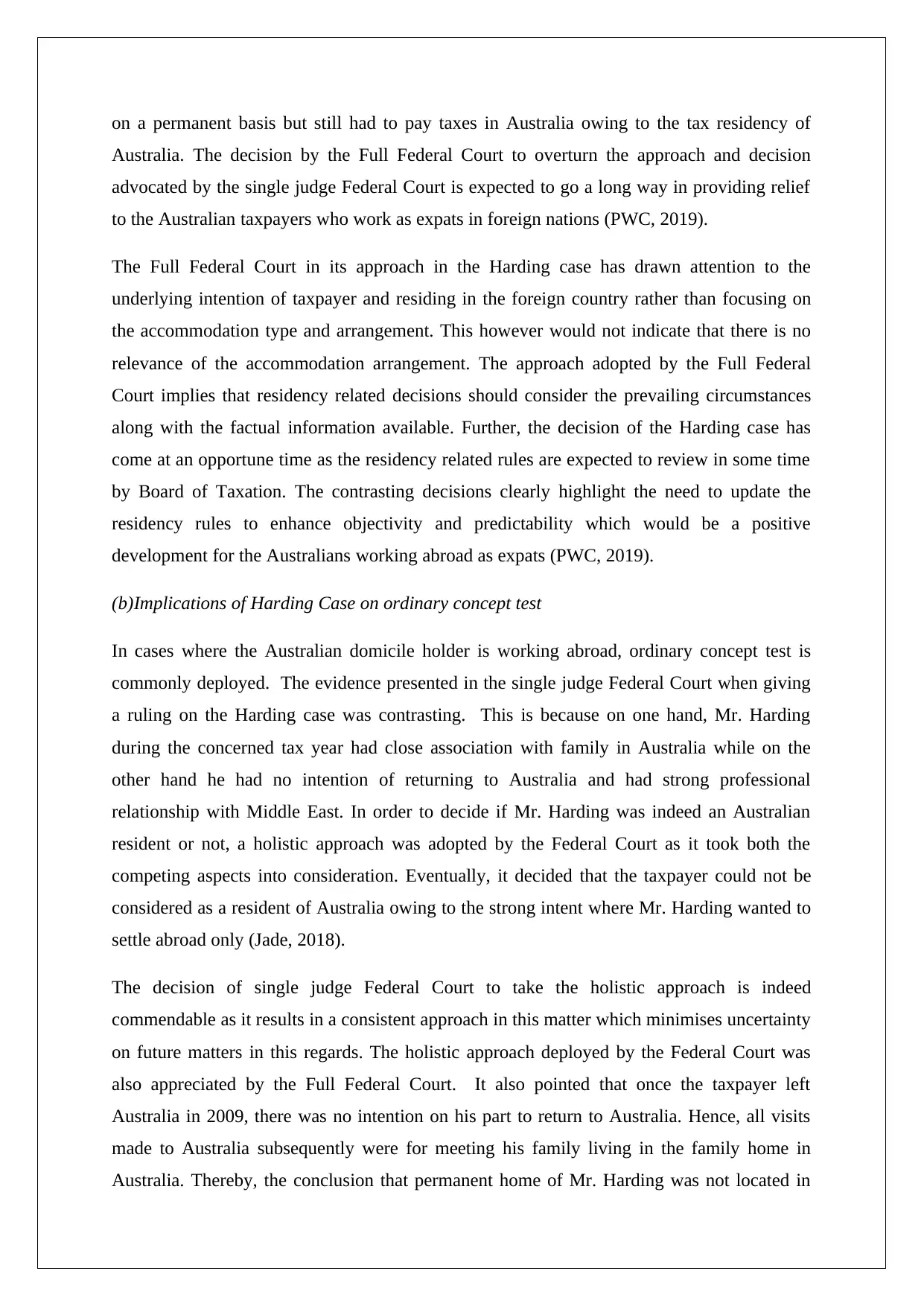
on a permanent basis but still had to pay taxes in Australia owing to the tax residency of
Australia. The decision by the Full Federal Court to overturn the approach and decision
advocated by the single judge Federal Court is expected to go a long way in providing relief
to the Australian taxpayers who work as expats in foreign nations (PWC, 2019).
The Full Federal Court in its approach in the Harding case has drawn attention to the
underlying intention of taxpayer and residing in the foreign country rather than focusing on
the accommodation type and arrangement. This however would not indicate that there is no
relevance of the accommodation arrangement. The approach adopted by the Full Federal
Court implies that residency related decisions should consider the prevailing circumstances
along with the factual information available. Further, the decision of the Harding case has
come at an opportune time as the residency related rules are expected to review in some time
by Board of Taxation. The contrasting decisions clearly highlight the need to update the
residency rules to enhance objectivity and predictability which would be a positive
development for the Australians working abroad as expats (PWC, 2019).
(b)Implications of Harding Case on ordinary concept test
In cases where the Australian domicile holder is working abroad, ordinary concept test is
commonly deployed. The evidence presented in the single judge Federal Court when giving
a ruling on the Harding case was contrasting. This is because on one hand, Mr. Harding
during the concerned tax year had close association with family in Australia while on the
other hand he had no intention of returning to Australia and had strong professional
relationship with Middle East. In order to decide if Mr. Harding was indeed an Australian
resident or not, a holistic approach was adopted by the Federal Court as it took both the
competing aspects into consideration. Eventually, it decided that the taxpayer could not be
considered as a resident of Australia owing to the strong intent where Mr. Harding wanted to
settle abroad only (Jade, 2018).
The decision of single judge Federal Court to take the holistic approach is indeed
commendable as it results in a consistent approach in this matter which minimises uncertainty
on future matters in this regards. The holistic approach deployed by the Federal Court was
also appreciated by the Full Federal Court. It also pointed that once the taxpayer left
Australia in 2009, there was no intention on his part to return to Australia. Hence, all visits
made to Australia subsequently were for meeting his family living in the family home in
Australia. Thereby, the conclusion that permanent home of Mr. Harding was not located in
Australia. The decision by the Full Federal Court to overturn the approach and decision
advocated by the single judge Federal Court is expected to go a long way in providing relief
to the Australian taxpayers who work as expats in foreign nations (PWC, 2019).
The Full Federal Court in its approach in the Harding case has drawn attention to the
underlying intention of taxpayer and residing in the foreign country rather than focusing on
the accommodation type and arrangement. This however would not indicate that there is no
relevance of the accommodation arrangement. The approach adopted by the Full Federal
Court implies that residency related decisions should consider the prevailing circumstances
along with the factual information available. Further, the decision of the Harding case has
come at an opportune time as the residency related rules are expected to review in some time
by Board of Taxation. The contrasting decisions clearly highlight the need to update the
residency rules to enhance objectivity and predictability which would be a positive
development for the Australians working abroad as expats (PWC, 2019).
(b)Implications of Harding Case on ordinary concept test
In cases where the Australian domicile holder is working abroad, ordinary concept test is
commonly deployed. The evidence presented in the single judge Federal Court when giving
a ruling on the Harding case was contrasting. This is because on one hand, Mr. Harding
during the concerned tax year had close association with family in Australia while on the
other hand he had no intention of returning to Australia and had strong professional
relationship with Middle East. In order to decide if Mr. Harding was indeed an Australian
resident or not, a holistic approach was adopted by the Federal Court as it took both the
competing aspects into consideration. Eventually, it decided that the taxpayer could not be
considered as a resident of Australia owing to the strong intent where Mr. Harding wanted to
settle abroad only (Jade, 2018).
The decision of single judge Federal Court to take the holistic approach is indeed
commendable as it results in a consistent approach in this matter which minimises uncertainty
on future matters in this regards. The holistic approach deployed by the Federal Court was
also appreciated by the Full Federal Court. It also pointed that once the taxpayer left
Australia in 2009, there was no intention on his part to return to Australia. Hence, all visits
made to Australia subsequently were for meeting his family living in the family home in
Australia. Thereby, the conclusion that permanent home of Mr. Harding was not located in
Paraphrase This Document
Need a fresh take? Get an instant paraphrase of this document with our AI Paraphraser
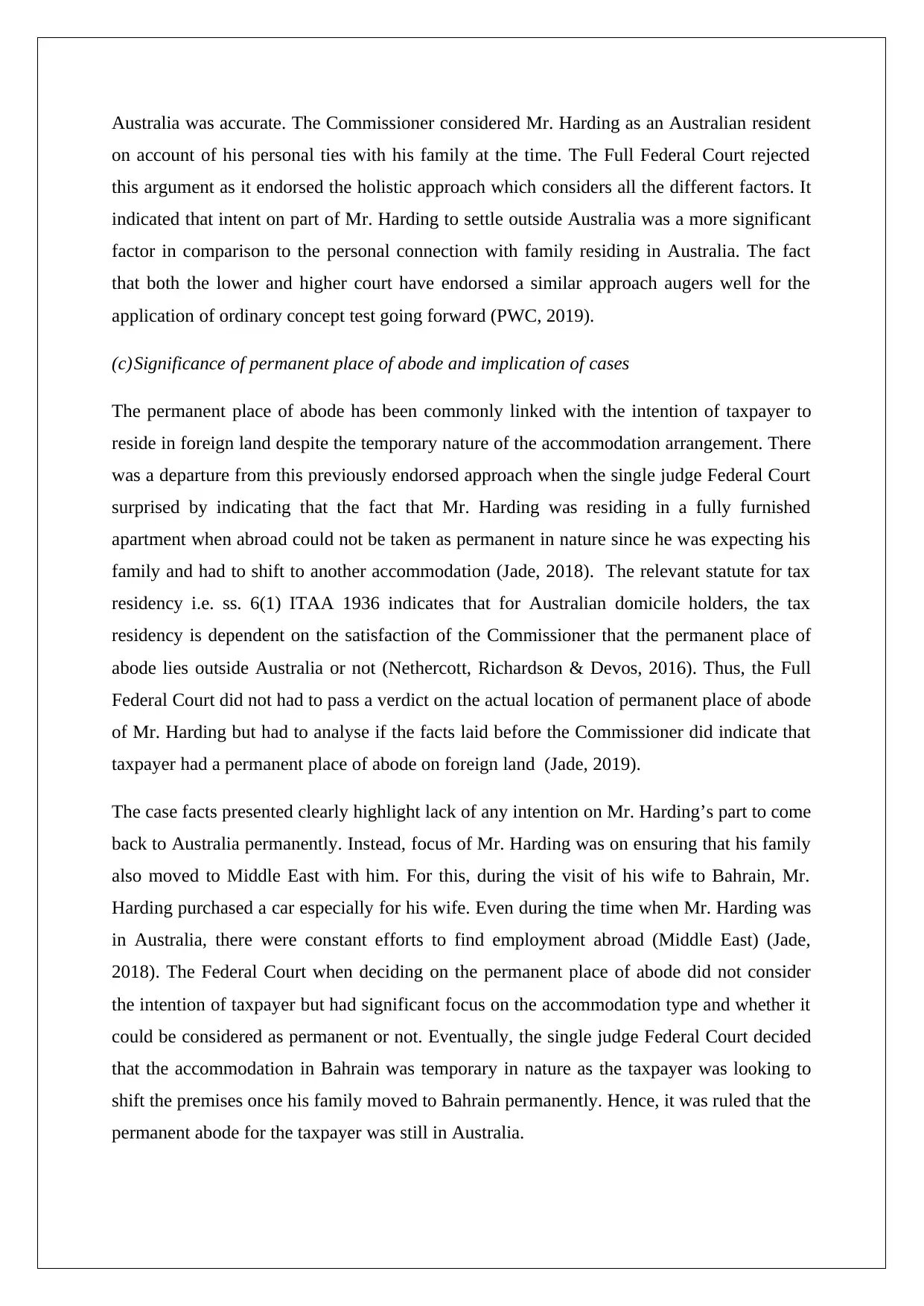
Australia was accurate. The Commissioner considered Mr. Harding as an Australian resident
on account of his personal ties with his family at the time. The Full Federal Court rejected
this argument as it endorsed the holistic approach which considers all the different factors. It
indicated that intent on part of Mr. Harding to settle outside Australia was a more significant
factor in comparison to the personal connection with family residing in Australia. The fact
that both the lower and higher court have endorsed a similar approach augers well for the
application of ordinary concept test going forward (PWC, 2019).
(c)Significance of permanent place of abode and implication of cases
The permanent place of abode has been commonly linked with the intention of taxpayer to
reside in foreign land despite the temporary nature of the accommodation arrangement. There
was a departure from this previously endorsed approach when the single judge Federal Court
surprised by indicating that the fact that Mr. Harding was residing in a fully furnished
apartment when abroad could not be taken as permanent in nature since he was expecting his
family and had to shift to another accommodation (Jade, 2018). The relevant statute for tax
residency i.e. ss. 6(1) ITAA 1936 indicates that for Australian domicile holders, the tax
residency is dependent on the satisfaction of the Commissioner that the permanent place of
abode lies outside Australia or not (Nethercott, Richardson & Devos, 2016). Thus, the Full
Federal Court did not had to pass a verdict on the actual location of permanent place of abode
of Mr. Harding but had to analyse if the facts laid before the Commissioner did indicate that
taxpayer had a permanent place of abode on foreign land (Jade, 2019).
The case facts presented clearly highlight lack of any intention on Mr. Harding’s part to come
back to Australia permanently. Instead, focus of Mr. Harding was on ensuring that his family
also moved to Middle East with him. For this, during the visit of his wife to Bahrain, Mr.
Harding purchased a car especially for his wife. Even during the time when Mr. Harding was
in Australia, there were constant efforts to find employment abroad (Middle East) (Jade,
2018). The Federal Court when deciding on the permanent place of abode did not consider
the intention of taxpayer but had significant focus on the accommodation type and whether it
could be considered as permanent or not. Eventually, the single judge Federal Court decided
that the accommodation in Bahrain was temporary in nature as the taxpayer was looking to
shift the premises once his family moved to Bahrain permanently. Hence, it was ruled that the
permanent abode for the taxpayer was still in Australia.
on account of his personal ties with his family at the time. The Full Federal Court rejected
this argument as it endorsed the holistic approach which considers all the different factors. It
indicated that intent on part of Mr. Harding to settle outside Australia was a more significant
factor in comparison to the personal connection with family residing in Australia. The fact
that both the lower and higher court have endorsed a similar approach augers well for the
application of ordinary concept test going forward (PWC, 2019).
(c)Significance of permanent place of abode and implication of cases
The permanent place of abode has been commonly linked with the intention of taxpayer to
reside in foreign land despite the temporary nature of the accommodation arrangement. There
was a departure from this previously endorsed approach when the single judge Federal Court
surprised by indicating that the fact that Mr. Harding was residing in a fully furnished
apartment when abroad could not be taken as permanent in nature since he was expecting his
family and had to shift to another accommodation (Jade, 2018). The relevant statute for tax
residency i.e. ss. 6(1) ITAA 1936 indicates that for Australian domicile holders, the tax
residency is dependent on the satisfaction of the Commissioner that the permanent place of
abode lies outside Australia or not (Nethercott, Richardson & Devos, 2016). Thus, the Full
Federal Court did not had to pass a verdict on the actual location of permanent place of abode
of Mr. Harding but had to analyse if the facts laid before the Commissioner did indicate that
taxpayer had a permanent place of abode on foreign land (Jade, 2019).
The case facts presented clearly highlight lack of any intention on Mr. Harding’s part to come
back to Australia permanently. Instead, focus of Mr. Harding was on ensuring that his family
also moved to Middle East with him. For this, during the visit of his wife to Bahrain, Mr.
Harding purchased a car especially for his wife. Even during the time when Mr. Harding was
in Australia, there were constant efforts to find employment abroad (Middle East) (Jade,
2018). The Federal Court when deciding on the permanent place of abode did not consider
the intention of taxpayer but had significant focus on the accommodation type and whether it
could be considered as permanent or not. Eventually, the single judge Federal Court decided
that the accommodation in Bahrain was temporary in nature as the taxpayer was looking to
shift the premises once his family moved to Bahrain permanently. Hence, it was ruled that the
permanent abode for the taxpayer was still in Australia.
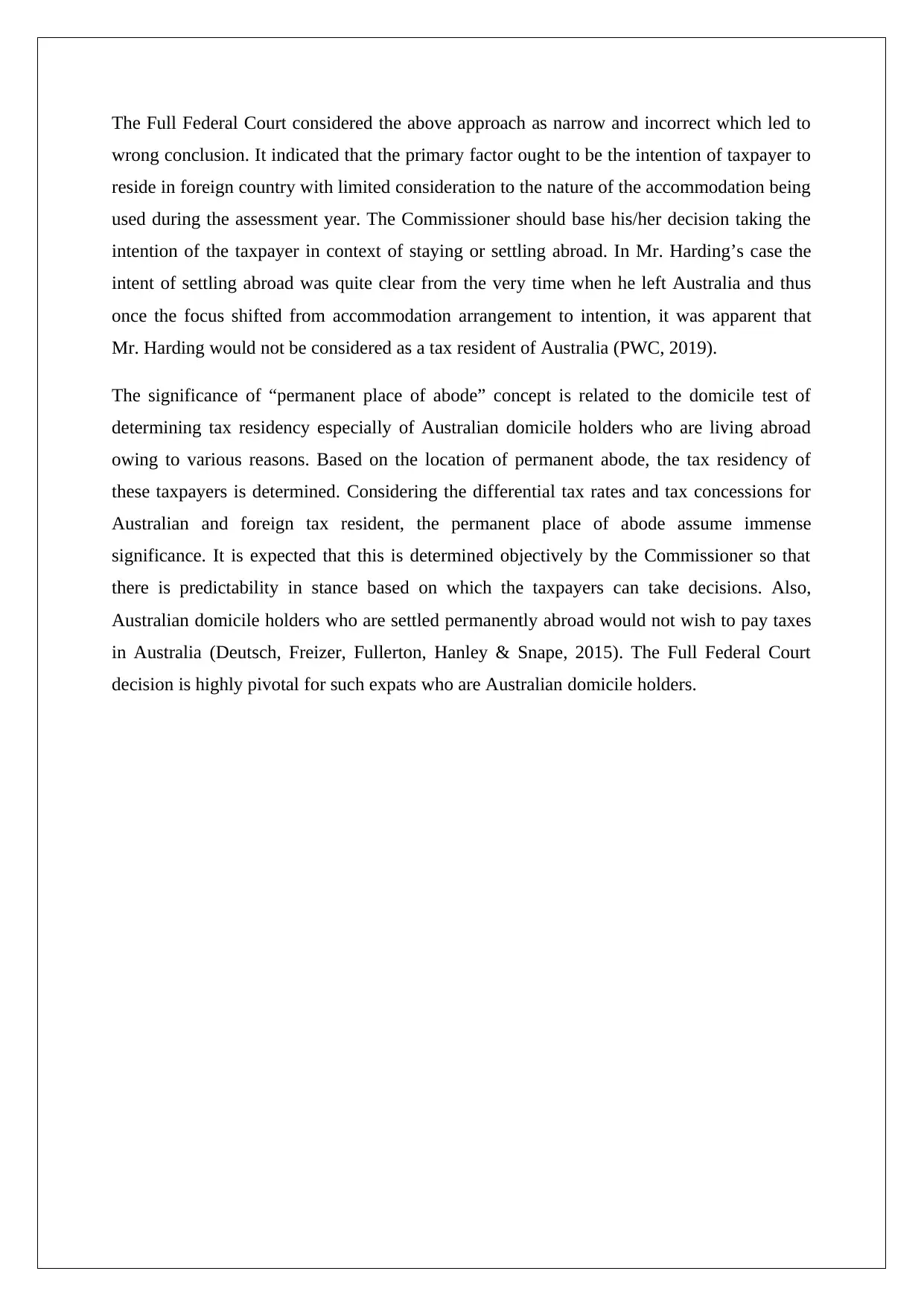
The Full Federal Court considered the above approach as narrow and incorrect which led to
wrong conclusion. It indicated that the primary factor ought to be the intention of taxpayer to
reside in foreign country with limited consideration to the nature of the accommodation being
used during the assessment year. The Commissioner should base his/her decision taking the
intention of the taxpayer in context of staying or settling abroad. In Mr. Harding’s case the
intent of settling abroad was quite clear from the very time when he left Australia and thus
once the focus shifted from accommodation arrangement to intention, it was apparent that
Mr. Harding would not be considered as a tax resident of Australia (PWC, 2019).
The significance of “permanent place of abode” concept is related to the domicile test of
determining tax residency especially of Australian domicile holders who are living abroad
owing to various reasons. Based on the location of permanent abode, the tax residency of
these taxpayers is determined. Considering the differential tax rates and tax concessions for
Australian and foreign tax resident, the permanent place of abode assume immense
significance. It is expected that this is determined objectively by the Commissioner so that
there is predictability in stance based on which the taxpayers can take decisions. Also,
Australian domicile holders who are settled permanently abroad would not wish to pay taxes
in Australia (Deutsch, Freizer, Fullerton, Hanley & Snape, 2015). The Full Federal Court
decision is highly pivotal for such expats who are Australian domicile holders.
wrong conclusion. It indicated that the primary factor ought to be the intention of taxpayer to
reside in foreign country with limited consideration to the nature of the accommodation being
used during the assessment year. The Commissioner should base his/her decision taking the
intention of the taxpayer in context of staying or settling abroad. In Mr. Harding’s case the
intent of settling abroad was quite clear from the very time when he left Australia and thus
once the focus shifted from accommodation arrangement to intention, it was apparent that
Mr. Harding would not be considered as a tax resident of Australia (PWC, 2019).
The significance of “permanent place of abode” concept is related to the domicile test of
determining tax residency especially of Australian domicile holders who are living abroad
owing to various reasons. Based on the location of permanent abode, the tax residency of
these taxpayers is determined. Considering the differential tax rates and tax concessions for
Australian and foreign tax resident, the permanent place of abode assume immense
significance. It is expected that this is determined objectively by the Commissioner so that
there is predictability in stance based on which the taxpayers can take decisions. Also,
Australian domicile holders who are settled permanently abroad would not wish to pay taxes
in Australia (Deutsch, Freizer, Fullerton, Hanley & Snape, 2015). The Full Federal Court
decision is highly pivotal for such expats who are Australian domicile holders.
⊘ This is a preview!⊘
Do you want full access?
Subscribe today to unlock all pages.

Trusted by 1+ million students worldwide
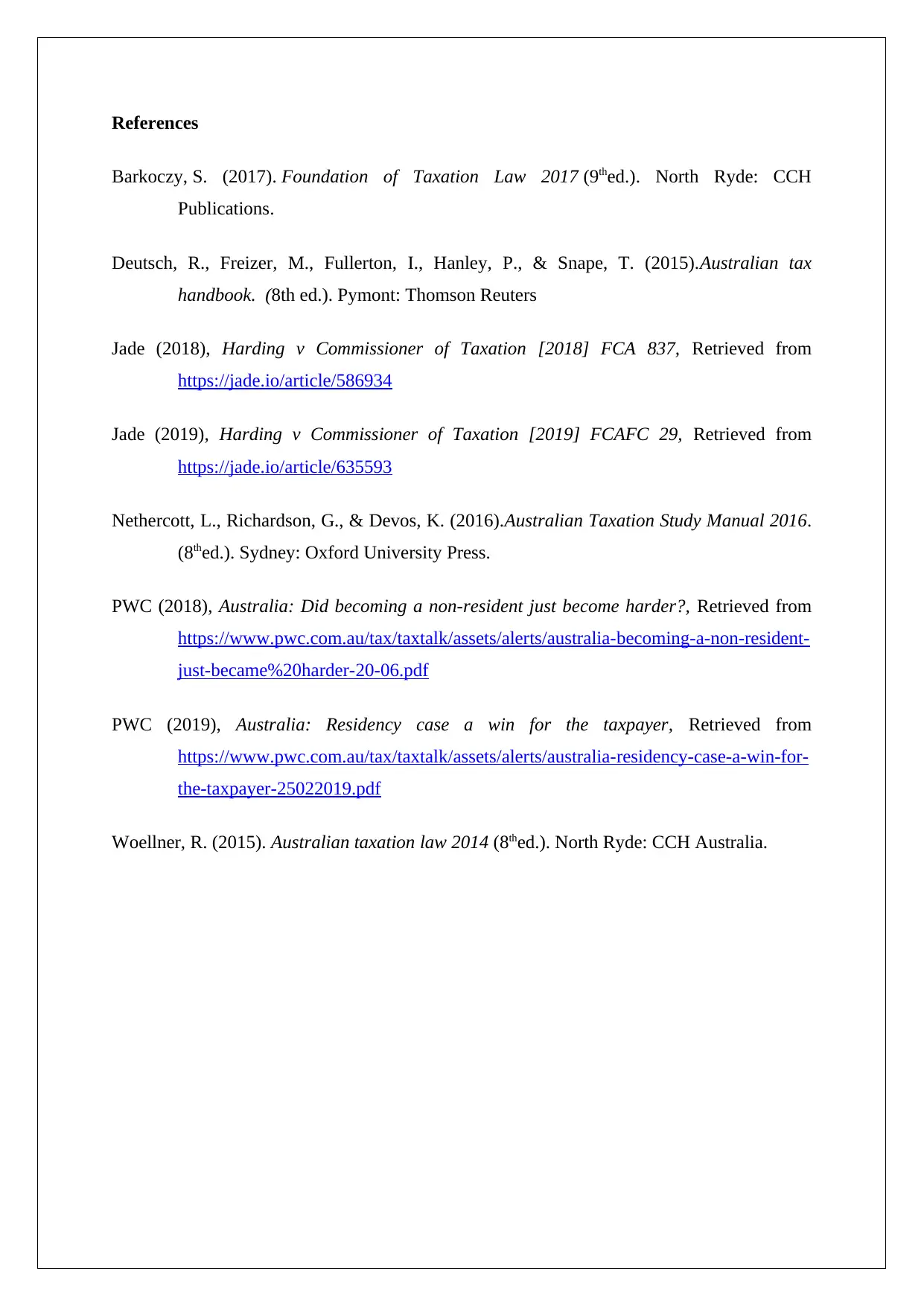
References
Barkoczy, S. (2017). Foundation of Taxation Law 2017 (9thed.). North Ryde: CCH
Publications.
Deutsch, R., Freizer, M., Fullerton, I., Hanley, P., & Snape, T. (2015).Australian tax
handbook. (8th ed.). Pymont: Thomson Reuters
Jade (2018), Harding v Commissioner of Taxation [2018] FCA 837, Retrieved from
https://jade.io/article/586934
Jade (2019), Harding v Commissioner of Taxation [2019] FCAFC 29, Retrieved from
https://jade.io/article/635593
Nethercott, L., Richardson, G., & Devos, K. (2016).Australian Taxation Study Manual 2016.
(8thed.). Sydney: Oxford University Press.
PWC (2018), Australia: Did becoming a non-resident just become harder?, Retrieved from
https://www.pwc.com.au/tax/taxtalk/assets/alerts/australia-becoming-a-non-resident-
just-became%20harder-20-06.pdf
PWC (2019), Australia: Residency case a win for the taxpayer, Retrieved from
https://www.pwc.com.au/tax/taxtalk/assets/alerts/australia-residency-case-a-win-for-
the-taxpayer-25022019.pdf
Woellner, R. (2015). Australian taxation law 2014 (8thed.). North Ryde: CCH Australia.
Barkoczy, S. (2017). Foundation of Taxation Law 2017 (9thed.). North Ryde: CCH
Publications.
Deutsch, R., Freizer, M., Fullerton, I., Hanley, P., & Snape, T. (2015).Australian tax
handbook. (8th ed.). Pymont: Thomson Reuters
Jade (2018), Harding v Commissioner of Taxation [2018] FCA 837, Retrieved from
https://jade.io/article/586934
Jade (2019), Harding v Commissioner of Taxation [2019] FCAFC 29, Retrieved from
https://jade.io/article/635593
Nethercott, L., Richardson, G., & Devos, K. (2016).Australian Taxation Study Manual 2016.
(8thed.). Sydney: Oxford University Press.
PWC (2018), Australia: Did becoming a non-resident just become harder?, Retrieved from
https://www.pwc.com.au/tax/taxtalk/assets/alerts/australia-becoming-a-non-resident-
just-became%20harder-20-06.pdf
PWC (2019), Australia: Residency case a win for the taxpayer, Retrieved from
https://www.pwc.com.au/tax/taxtalk/assets/alerts/australia-residency-case-a-win-for-
the-taxpayer-25022019.pdf
Woellner, R. (2015). Australian taxation law 2014 (8thed.). North Ryde: CCH Australia.
1 out of 7
Related Documents
Your All-in-One AI-Powered Toolkit for Academic Success.
+13062052269
info@desklib.com
Available 24*7 on WhatsApp / Email
![[object Object]](/_next/static/media/star-bottom.7253800d.svg)
Unlock your academic potential
Copyright © 2020–2026 A2Z Services. All Rights Reserved. Developed and managed by ZUCOL.





